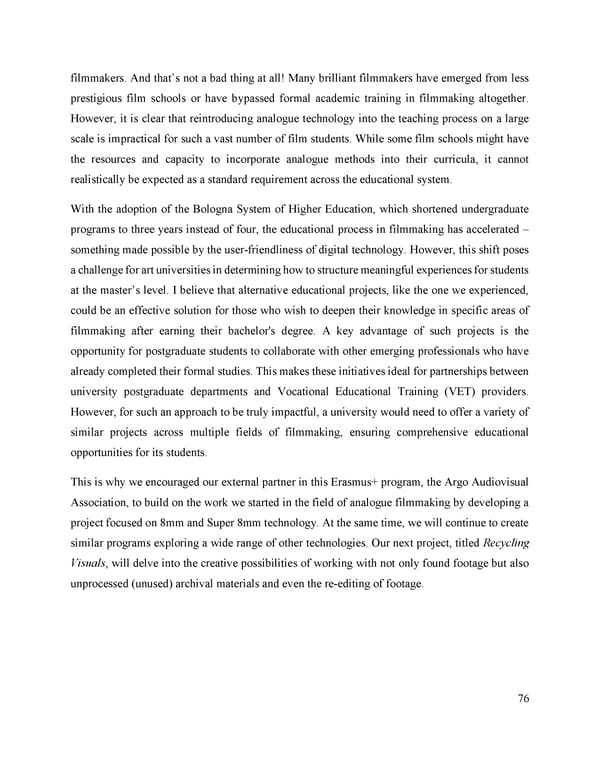filmmakers. And that’s not a bad thing at all! Many brilliant filmmakers have emerged from less prestigious film schools or have bypassed formal academic training in filmmaking altogether. However, it is clear that reintroducing analogue technology into the teaching process on a large scale is impractical for such a vast number of film students. While some film schools might have the resources and capacity to incorporate analogue methods into their curricula, it cannot realistically be expected as a standard requirement across the educational system. With the adoption of the Bologna System of Higher Education, which shortened undergraduate programs to three years instead of four, the educational process in filmmaking has accelerated – something made possible by the user-friendliness of digital technology. However, this shift poses a challenge for art universities in determining how to structure meaningful experiences for students at the master’s level. I believe that alternative educational projects, like the one we experienced, could be an effective solution for those who wish to deepen their knowledge in specific areas of filmmaking after earning their bachelor's degree. A key advantage of such projects is the opportunity for postgraduate students to collaborate with other emerging professionals who have already completed their formal studies. This makes these initiatives ideal for partnerships between university postgraduate departments and Vocational Educational Training (VET) providers. However, for such an approach to be truly impactful, a university would need to offer a variety of similar projects across multiple fields of filmmaking, ensuring comprehensive educational opportunities for its students. This is why we encouraged our external partner in this Erasmus+ program, the Argo Audiovisual Association, to build on the work we started in the field of analogue filmmaking by developing a project focused on 8mm and Super 8mm technology. At the same time, we will continue to create similar programs exploring a wide range of other technologies. Our next project, titled Recycling Visuals, will delve into the creative possibilities of working with not only found footage but also unprocessed (unused) archival materials and even the re-editing of footage. 76
 Lost Analogue: Exploring Film, Music, and Interdisciplinary Methods in Education Page 76 Page 78
Lost Analogue: Exploring Film, Music, and Interdisciplinary Methods in Education Page 76 Page 78